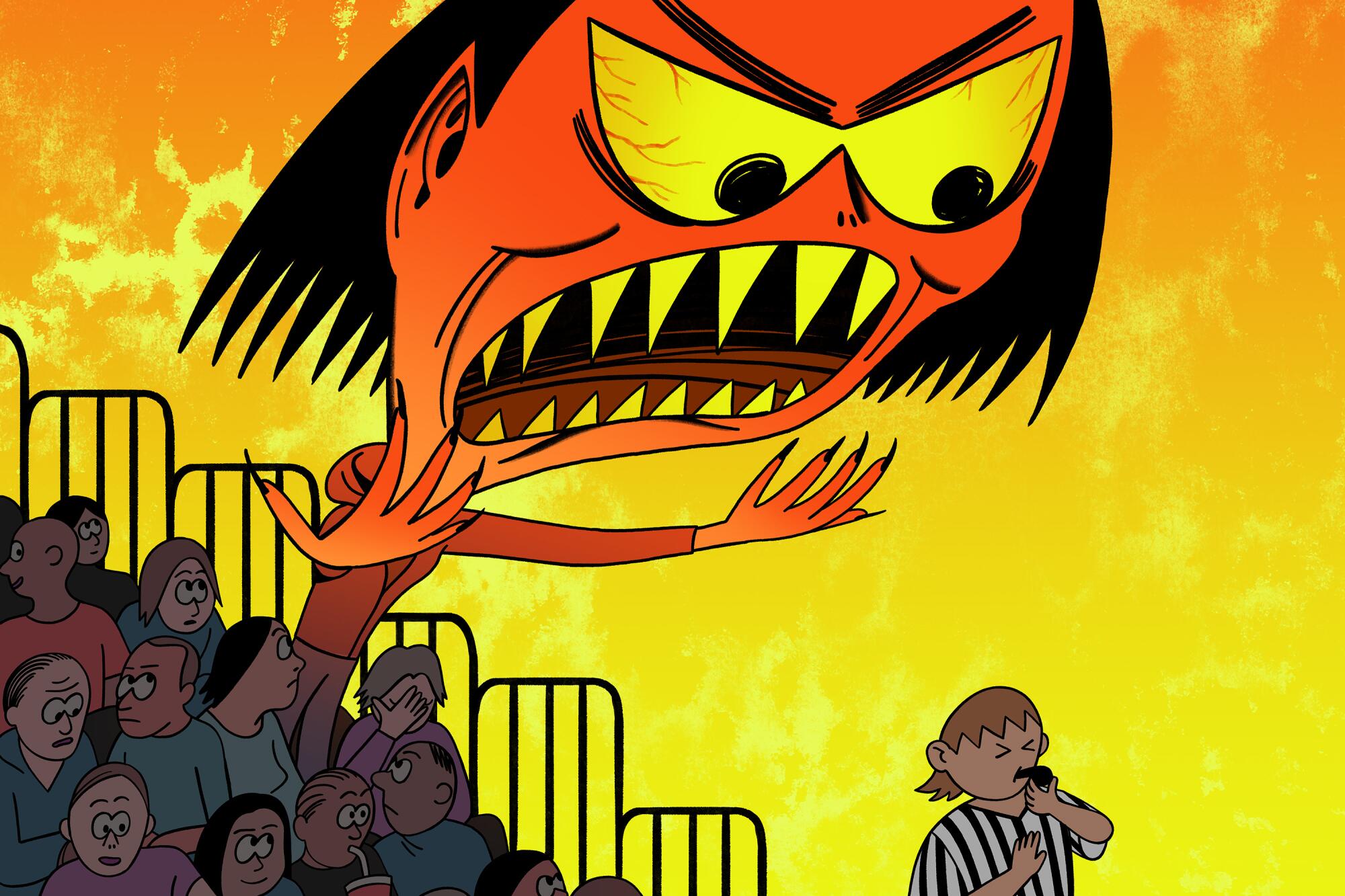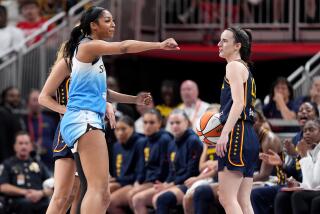
This column is the second installment in a series on parenting children in the final years of high school, “Emptying the Nest.” Read the first installment, about the trials of junior year, here.
A while back, I sat in the aggressive discomfort of the bleachers at my youngest daughter’s high school basketball game and vibrated with rage. After nearly 20 years of watching my children play youth sports, I thought I had tamed the “What game are you looking at, ref?” beast that lurks within us all, but no. There it was, roaring to life as my daughter, for reasons clear only to the men with whistles, fouled out in the third quarter.
I didn’t yell or suggest that the officials were in cahoots with the other team, as some people to whom I am married did. But I did exacerbate my TMJ. Of course my daughter commits fouls. Everyone commits fouls. But most of these calls appeared ridiculous.
Though not, perhaps, as ridiculous as me. There I sat, a full-grown woman, aware that I was watching the next-to-last season of a decade’s worth of high school sports, and ruining it by quietly coming out of my skin over what I considered a few bad calls.
So instead of grinding my teeth into nubs, I finally embraced my ref rage and tried to explore its contours.
What was I furious about, really? That we had paid $24 to watch our daughter sit on the bench? That she comes out of games with bruises all over her midsection and four-inch scratch marks down her arms, but at 5’10” seems to be regularly penalized for playing while tall? That the refs did appear quite chummy with the other team’s coach?
No, I was angry because two other adults had been granted temporary but quite specific control over my daughter’s life and I did not think they were administering it fairly.
And there was not a damn thing I could do about it.
The pressure cooker of junior year hurts students and parents alike, columnist Mary McNamara writes in the first installment in a new series, ‘Emptying the Nest.’
As I fast approach the final year of my last round of hands-on parenting, I realized that this is the best, and the worst, part about being the parent of a young athlete: We get a taste of what the future holds long before our direct participation in our child’s life necessarily comes to an end.
Years before we send them into a world where parents have little or no role — with college professors, bosses, colleagues, landlords, whatever — youth athletics prepare us for a time when our job, as parents, is to sit, watch and cheer (or grind our teeth) when appropriate.
American parents get a lot of flak, often justifiably, for their over-involvement in their children’s lives. But even the non-helicopters among us run a certain amount of interference; it’s part of the job. Up to the middle school years, we might engage in conversations with other parents when young friendships turn into feuds; from pre-K to high school, if a child appears to be struggling academically or socially, we meet with teachers, counselors and administrators. (Some parents, God help them, attempt to do this throughout college.)
When it comes to sports, however — well, let’s just say I have learned the hard way that once your child is 8 or 9, no coach has any interest in your thoughts on their abilities or the position, number of minutes or role those abilities should accord them.
And your child will not appreciate your efforts either. In my house, the simple phrase “Maybe I should just talk to your coach” has long guaranteed improved study habits / tone of voice / chore completion. Honestly, they would, and will, do anything to prevent this disaster from occurring.
As for the refs, unless you actually know the people wielding the whistles, the only appropriate interaction is a friendly nod, silence and a word of thanks at the end of the game.
Sports can teach kids many things — the necessity of practice and commitment, the importance of teamwork, the ability to take direction and remain composed under pressure.
Parents, on the other hand, mainly learn to let go and suck it up. Which are difficult but very useful lessons.
If you genuinely think a coach is terrible, you can take your kid off the team. But by its very nature, being coached is often an uncomfortable, and occasionally infuriating and/or devastating, process. Which you, as a parent, are experiencing secondhand. Most likely you will be forced, by your own child if not common sense, into an active course of doing nothing.
And if you are unhappy with the refs, well, too bad, so sad, Charlie. Because, as I repeatedly remind my spouse and will now say loudly for everyone in the back row, yelling at the refs never, ever, helps anything.
Unless you like having your child die from mortification before your very eyes.
But it’s so hard, isn’t it? Not only is yelling at the refs an international pastime, that’s your kid out there taking an elbow to the mouth, resulting in four visits to the dentist and no foul call — only for her to get the whistle when she is standing completely still with her hands in the air.
Especially considering what we’re paying for the experience: door fees, endless fundraisers, private trainers and, for many, the expense of travel teams. Youth sports is big business, leveraging parents’ desire to see their children succeed, early, often and in front of appreciative crowds.
I put my young children into sports mainly so they could burn off some energy in a way that did not involve me literally running after them. When, one after the other, they stood out on their early teams, I was shocked. Even my husband, a former high school athlete, was a bit surprised by the amount of attention preternaturally sporty kids now get, from other coaches, parents and recruiters for “elite” youth programs.
But who wants to deny that their child is exceptional? The moment you put your child on a travel team, everyone assumes the goal is playing in college. Which means you can expect solicitations for all sorts of evaluation programs and advisory teams.
Suddenly we found ourselves — two well-educated, otherwise sensible adults! — imagining our elementary-age children eventually suiting up for some big Division I team.
My kids loved to play and remained good enough to justify trainers, tournaments and, with my older daughter, trips to various universities’ camps for identifying talent. None of which resulted in my older kids playing in college, never mind getting the mythical full ride — our son’s athletic career was derailed by surgery in high school and our older daughter decided that she did not want a college career shaped by soccer.
For the record, I regret nothing. Scholarships and playing on a college team are not the only way to measure the success of youth athletics. My children learned that all the early talent in the world does not replace the need for hard work. Years in the stands and on sidelines gave me some of the best friends I and my children have, created a wealth of irreplaceable family memories — including an internal map of every Panera and Starbucks in Southern California — and taught me a number of other invaluable lessons.
College freshmen will soon head home for the holidays, ready to fill in their parents on all the fresh experiences in their new lives.
As I sat quietly seething after my youngest fouled out recently, I comforted myself with a few of said lessons, including but not limited to:
1. If you think your kid is the next Lamar Jackson/Serena Williams/Caitlin Clark you could be right — but you’re probably wrong. There’s a great episode of “black-ish” (“Any Given Saturday”) in which Dre (Anthony Anderson) and Bow (Tracee Ellis Ross) are convinced their youngest son is a basketball prodigy. Until he gets on a serious travel team. If your child is truly gifted, it will be made clear only over a number of years as they devote themselves totally to all the work elite-level athletics require.
2. Every single parent thinks their kid should get more playing time. Every. Single. One. Do the math.
3. The refs are just doing their job, which is a difficult one. As in any occupation, some are better at it than others and even the best are only human. Keep your commentary for the ride home — that is why God invented cars — and remember: It is quite possible that you were wrong and they were right.
4. Do not yell at your kids during a game. (The sound you hear is my older daughter laughing bitterly as she reads this.) Not just because it makes you look like a jerk, but also because, like yelling at refs, it does not help. When you yell at your kid loud enough for them to hear, you force them to think not about the game but about you. How embarrassing you are, what your anger may portend, why they even bother when nothing they do makes you happy. How is that going to help the situation?
5. If you have a deep-seated need for your team to always win and/or your child to be the star of every game because you think it reflects well on you, please admit this to yourself and get therapy immediately.
6. Most kids are not the star of the team. Again, math. Also, success is not defined by the number of points your child personally scores.
7. Do not put too much stock into unsolicited advice from other parents on what you should “do” with or for your kid. There are always a few who think they know everything. They usually do not.
8. Early success in most sports has as much to do with size, hand-eye coordination and speed than any innate talent. Kids develop at different rates. Don’t get too excited too soon; everyone else will probably catch up.
9. It is OK to appreciate and acknowledge athletic prowess that is not your child’s own. This may be a bit easier for women like me who remember those pre-Title IX days when celebrated female athletes were still the exception. Even when my daughter’s team is getting trounced, I am grateful she lives in a world where so many girls at every level are encouraged to play and keep playing.
10. It should be fun, at least most of the time. There will always be bad games, injuries, intra-team conflicts, painful coaching, personal disappointments, questionable reffing, opponents who play super dirty. But there should also be joy, of the sustained variety. That joy can come from spectacular performance or slow improvement, from a string of trophies or just the pleasure of being on a team and participating in a beloved sport. But if there is no joy, then there are plenty of other things your child, and your family, can do. And most of them do not involve refs.
More to Read
The biggest entertainment stories
Get our big stories about Hollywood, film, television, music, arts, culture and more right in your inbox as soon as they publish.
You may occasionally receive promotional content from the Los Angeles Times.












